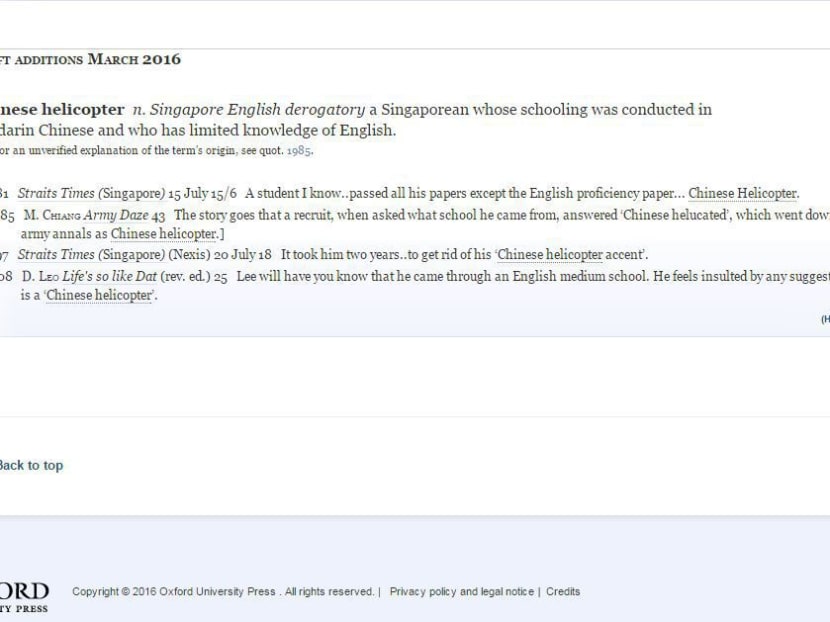Ho Ching supports petition to ground ‘Chinese helicopter’
SINGAPORE — When it was reported that several Singlish words had been added to the Oxford English Dictionary (OED), the announcement drew its fair share of supporters and detractors.

Some Singaporeans want 'Chinese helicopter' out of the Oxford English Dictionary. Photo: Oxford English Dicitionary website.
SINGAPORE — When it was reported that several Singlish words had been added to the Oxford English Dictionary (OED), the announcement drew its fair share of supporters and detractors.
But recently, one phrase seems to have been singled out by several netizens, all of whom agree that it should be taken out of the lexicon.
The phrase? “Chinese helicopter”.
The reason? It’s insulting and derogatory, said Mdm Goh Beng Choo who started a petition on the website Change.org two weeks ago to have that phrase removed from the OED.
“The term ‘Chinese helicopter’ uses punning to tease Chinese-educated people in Singapore,” she wrote in her petition, which has gained 456 supporters. “It is highly disrespectful and if it stays in the dictionary, it will give the impression that it is an acceptable term.”
She added: “It is actually insensitive and highly derogatory and will hurt millions of elderly Chinese-educated citizens. It will pollute the language learning of young generations of Singaporeans.”
The petition gained a prominent supporter on Thursday when Madam Ho Ching, Prime Minister Lee Hsien Loong’s wife, said she supported the move to ground the “Chinese helicopter”.
In a Facebook post, Madam Ho wrote that she was “so surprised” that the OED had included the phrase as part of their new Singlish entries, given that it is no longer commonly used.
“I had only heard this being used in my late teens in the early 1970s, listening in on the chatter of NS (National Service) boys from English stream schools explaining this term they had learnt during their BMT (Basic Military Training) about their NS mates from Chinese stream schools,” she wrote.
“However, with a bilingual education system since, we no longer have separate English and Chinese stream schools for decades.”
Madam Ho added: “Given its lack of currency in the Singlish lexicon today, I would support the petition to remove this term from the OED entry.”
Others echoed her sentiments. “I’m not familiar with the term,” said Mdm Lai, who is a mother of three. “Why would they choose an unfamiliar term (to be included)? It is not used every day. Why pick a phrase that nobody seems to know? Wouldn’t it be better to put commonly used words? It’s irrelevant.”
However, there are those who argued that a phrase shouldn’t be singled out just because it’s derogatory or not used any more.
Mr Lee Meng, who works as a driver, said: “In that case, then those old English words, like ‘thee’, shouldn’t be in the dictionary too, right? If you don’t know a word, you look at the dictionary, right? That’s what it’s for.”
“You see expletives in (the OED),” added bank executive Mishal T. “You also see other derogatory words. Why should this word not be in there? If that’s the case, then the phrase ‘ang moh’ should also be removed, right?”








